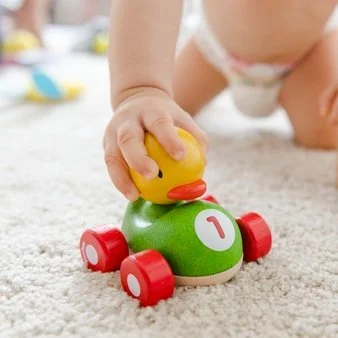Why Motherhood Can Feel Front-Loaded
As we move rapidly towards the end of July I find myself trying to squeeze as much summer leisure time in as I can. Most recently this meant celebrating my three-year-old niece's birthday and spending three nights camping locally. The first night was spent camping alone, a tradition I started last summer when we realized that my youngest wasn't looking exclusively for me when he stirred in the night. As a work-from-home primary parent, prioritizing me has been something I've had to work hard on. And I don't think I'm the only one.
I believe that part of the reason it is challenging for many moms to prioritize themselves is that very little is static in the early days of motherhood and the needs —at times unpredictable, and at other times seemingly unrelenting— are high. Regular plans are often not realistic, and elaborate get-aways are rarely in the cards. Things can feel so busy in the early days of parenting that even finishing a cup of coffee or tea or completing one key task like laundry can take all day. Needs from our wee ones are aren't always easily met by others including our partners.
When my three children joined me for the second two nights of camping, I reflected on the idea that parenting, like sleep development and regressions, is not an even, predictable balance of self and mothering. The early years of parenting are HEAVY on the giving side: our babies need everything from us. It is hard to etch out solo time, down time, and veg time. However, as time (and infant development) progresses, there are shifts towards independence -at night, during play, and during transitions to activities and other caregivers. Over time, emotional development, weaning to solids, and a shift in the need for physical contact lead to an ever widening circle of loving caregivers. And an ever widening possibility for moms to more easily step away for a break.
Nights away to camp by myself (something I never would have considered before becoming a mother) are now possible because of infant and child development —and I relish this time by myself. And when we see each other afterwards, I love the reunion: the hugs, the excitement in sharing stories of things that happened when I wasn't there (a novel thing for a stay-at-home parent!). I cherish both sides of this: the time to be alone, and the time to re-connect. I cherish it in a way I wouldn't have, had I not been aware of the front-loading of motherhood in the early years.
I’m certain I will look back as a mom of teenagers and see the limits to this outlook. It may be that parenthood is front loaded in physical and instrumental ways (feeding, dressing, comforting in arms, soothing, etc), but later the emotional needs continue to be high, even if kids begin to master making their own lunches and doing the laundry themselves. There is no question, however, that the first three years of motherhood, in particular, are intense.
Is there some holy grail of mother-self balance in these early years? Perhaps. But what matters more than finding that perfect balance is finding a balance that feels do-able right now. Things will change. My boys will need my physical help less over time. A one day night away might turn into three. There will be fewer requests for help with laces. They won’t ask for my help in sliding down the fireman’s pole at the playground. And until then, finding ways to fill our own cups, to take a breath, to pause, and to rest is challenging but so very important.
There will be times when even my kids’ burgeoning independence will shift and they will need more —it’s an uneven trajectory towards adulthood. Being open to meeting their needs now leaves me feeling more open to it all —it leaves me feeling more open to saying “yes” and dismissing the myth that meeting a need prevents independence. And it leaves me feeling glad that I was able to lean into parenting in the early years —to meet the need with little doubt that this is what will support our ultimate goal: to raise confidence, happy, and self-aware adults who make a positive difference in the world.
As my three become increasingly independent, I can see how they are emerging with a sense of firm self-assuredness, even when faced with less than ideal situations that crop up from time to time. They know what feels right in the world because they have been supported in feeling right in the world as infants. Feeling right in the world comes from having needs met. Independence may be a highly valued characteristic, but feeling right in the world as a young child is about dependence, trust, and security. And it starts with leaning into what is happening right now.
Additional Resources:
Gordon Neufeld, “Bring Relief from Alarming Feelings and Build Resilience” https://www.youtube.com/watch?v=xH-yCqFgEjo
Colleen Drobot, “Understanding the Sensitive Child from the Inside Out”, https://neufeldinstitute.org/understanding-the-sensitive-child-from-the-inside-out/

